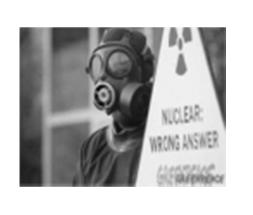Tell the Children
 Remember those chilling years in the early 1960s when we believed the world was on the verge of nuclear war? Bay of Pigs, Berlin Wall, Cuban Missile Crisis—a litany of close-to-the-brink international face-offs left us paralyzed with fear, wondering if we were living out our last days. Do you talk to any young people about that period?
Remember those chilling years in the early 1960s when we believed the world was on the verge of nuclear war? Bay of Pigs, Berlin Wall, Cuban Missile Crisis—a litany of close-to-the-brink international face-offs left us paralyzed with fear, wondering if we were living out our last days. Do you talk to any young people about that period?
Although the world is armed to the teeth, nuclear confrontation is rarely discussed now. The US and Russia have 25,000 nuclear weapons between them. Nine countries belong to the “nuclear club,” with others well on the way. But for most people, the fear is that nuclear weapons will get into the hands of the “wrong” people. Stopping nuclear proliferation is the goal, not ridding the world of nuclear weapons. “Today, nuclear weapons are gaining legitimacy,” writes Jacqueline Cabasso in Nuclear Disorder or Cooperative Security, “as the world's only remaining superpower blurs the distinction between nuclear and conventional weapons and expands the role of nuclear weapons in ‘national security' policy.” We have accepted the unacceptable.
Gray Panthers and others of our generation have stories to tell about how nuclear weapons changed our world. What was it like before and after the A-bomb? Did the arms race change your view of the future? Is outlawing nuclear weapons just a utopian dream? We are the historians now. These are things ensuing generations need to know.
In 1982, nearly a million people gathered in New York's Central Park to call for an end to the arms race. It was the largest political demonstration in the history of the country. Recent years have brought huge demonstrations against the war in Iraq, but the expanding US nuclear arsenal elicits little comment. Incredibly, the latest addition, reliable replacement warheads, for which the Bush administration is requesting nearly half a billion dollars in the 2008 budget, is being presented as a way to reduce the nuclear stockpile.
We must oppose this double talk with straight talk. Tell the children about those days of nuclear brinkmanship. They need to know.